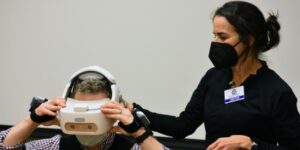
A n employee at the Gulf Coast Veterans Health Care System (GCVHCS) in Biloxi, MS, learns how to use a new virtual reality rehabilitation system designed to improve veteran rehabilitation therapeutic activities. VA photo
ALAMEDA, CA — In partnership with the VA’s Office of Healthcare Innovation and Learning (OHIL), Penumbra Inc. aims to change the way veterans receive and literally see rehabilitation services. The collaboration will develop tools based on Penumbra’s REAL y-Series technology to meet veterans’ most critical rehabilitation needs and expand access to services.
The VA recently granted Alameda, CA.-based Penumbra a 3-year contract to test, co-develop and scale virtual reality solutions which can increase access to rehabilitation care at CBOCs and in homes. REAL y-Series is a hands-free, non-tethered, multidisciplinary virtual reality (VR) rehabilitation platform capable of supporting patients with acute needs as well as those able to function at a high level.
“Our goal is to produce thoughtfully designed, developed and implemented solutions based on a deep understanding of veterans’ health care needs,” said OHIL Immersive Technology Lead Anne Lord Bailey, PharmD. “We believe immersive technology is defining a new reality in veteran healthcare, and we’re excited to see how this expansion in rehabilitation care furthers that vision.”
The tools will initially focus on neurorehabilitation, orthopedics, chronic pain and chronic condition management for veterans. The first sites to offer the technology will be the VAMCs in Richmond, VA; Asheville, NC; Los Angeles; Des Moines, IA; Orlando, FL, and Eastern Colorado.
The need is substantial. The VA provided physical therapy and rehabilitation services to more than 760,000 veterans in 2019, accounting for approximately 2.8 million encounters. While the agency already employs more physical therapists—2,300—than any other organization in the U.S., delivering services to rural veterans remains challenging.
Expanding Access
Ultimately, the partnership aims to adapt the VR technology to use in remote therapeutic rehabilitation and monitoring through both synchronous and asynchronous interactions.
“The technology is visionary,” said Mark Havran, DPT, national physical therapy executive for the VA and chief of Extended Care and Rehabilitation at the VA Central Iowa Healthcare System in Des Moines. “We foresee this will allow an extension of our clinics and education tools beyond brick and mortar. The patient, the caregiver and the interdisciplinary team will be able to improve access, functional outcomes, and [there will be] less downstream costs while having a mix of services available.”
The REAL y-Series, launched in November 2022, includes a tablet, head-mounted display and a library of clinically based activities. It facilitates rehab for both upper and lower extremities with its full body avatar combined with upper and lower body sensors that enable tracking of the entire body in real time as a patient performs a personalized program of exercises and activities.
The system also helps patients receiving occupational or physical therapy simultaneously work on improving their mental health and cognitive function. It is used in hospitals across the U.S. to build core strength, improve balance, provide cognitive stimulation and improve cognition and return patients to performing activities of daily living.
Increasing Engagement
Just as medication doesn’t work if you don’t take it, rehab doesn’t help if you don’t do it. In a survey, 75% of physical therapists reported that compliance was the biggest challenge in physical therapy. Notably, half the respondents felt that VR would improve compliance.
Penumbra says it does. The full body experience and the personalization of therapy sessions to meet physical, emotional and mental health needs increases patient engagement and commitment. At the same time, clinicians can customize the activities to maintain motivation and increase challenge while tracking progress during each session. The combination contributes to better outcomes.
With its REAL y-Series, “Penumbra is advancing the latest immersive healthcare technology to help patients get back to their life with as little impairment as quickly as possible. VR in healthcare can be an extraordinary resource in rehabilitation and, with our full body immersive innovation, we know we can have a tremendous impact on a broad range of patients,” said Gita Barry, president of Penumbra’s Immersive Healthcare business.
Other Innovations
The VA also has partnered with WizeCare, which uses artificial intelligence to improve diagnoses and physical therapy in-clinic, through telehealth or in a completely automated format. WizeCare uses a gamified technology, MoveAI, to boost veteran engagement by offering rewards for performing movements correctly. That innovation brought adherence to physical therapy plans to 70%.
The VA is no newcomer to using virtual reality in healthcare, either. The VA Immersive program has provided more than 1,200 virtual reality headsets to veterans at more than 160 VAMCs and CBOCs across all 50 states and Puerto Rico.
“VHA is one of the most impactful and forward-thinking innovators in healthcare, constantly promoting discovery and adoption of the latest technologies to advance care delivery and service,” Barry said. “It is a great honor to work with the VHA on such an important initiative to not only maximize the key benefits of rehabilitation therapy with virtual reality but to also broadly implement these tools so veterans, whether at a VA facility or in a remote location, will have access to these offerings.”

